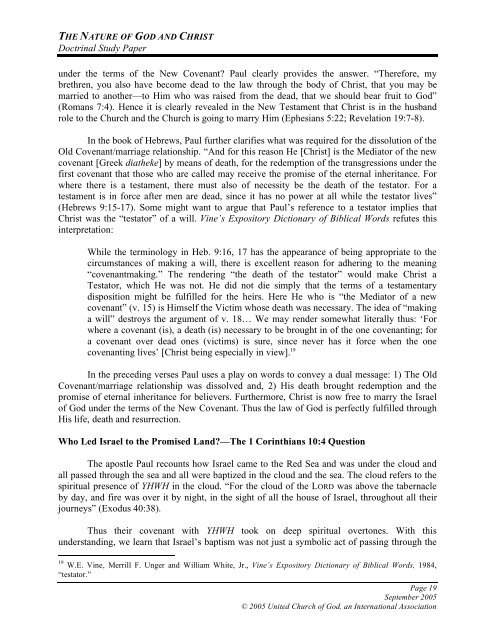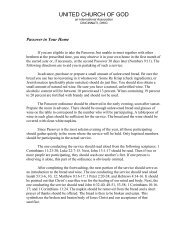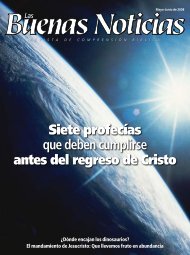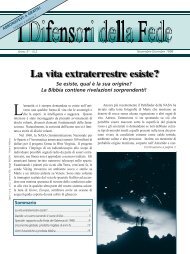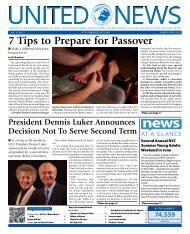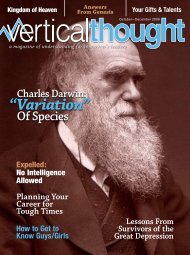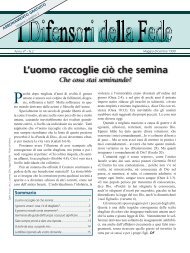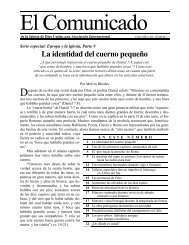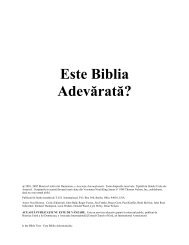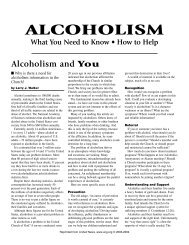The Nature of God and Christ - Members Site - United Church of God
The Nature of God and Christ - Members Site - United Church of God
The Nature of God and Christ - Members Site - United Church of God
- No tags were found...
You also want an ePaper? Increase the reach of your titles
YUMPU automatically turns print PDFs into web optimized ePapers that Google loves.
THE NATURE OF GOD AND CHRISTDoctrinal Study Paperunder the terms <strong>of</strong> the New Covenant? Paul clearly provides the answer. “<strong>The</strong>refore, mybrethren, you also have become dead to the law through the body <strong>of</strong> <strong>Christ</strong>, that you may bemarried to another—to Him who was raised from the dead, that we should bear fruit to <strong>God</strong>”(Romans 7:4). Hence it is clearly revealed in the New Testament that <strong>Christ</strong> is in the husb<strong>and</strong>role to the <strong>Church</strong> <strong>and</strong> the <strong>Church</strong> is going to marry Him (Ephesians 5:22; Revelation 19:7-8).In the book <strong>of</strong> Hebrews, Paul further clarifies what was required for the dissolution <strong>of</strong> theOld Covenant/marriage relationship. “And for this reason He [<strong>Christ</strong>] is the Mediator <strong>of</strong> the newcovenant [Greek diatheke] by means <strong>of</strong> death, for the redemption <strong>of</strong> the transgressions under thefirst covenant that those who are called may receive the promise <strong>of</strong> the eternal inheritance. Forwhere there is a testament, there must also <strong>of</strong> necessity be the death <strong>of</strong> the testator. For atestament is in force after men are dead, since it has no power at all while the testator lives”(Hebrews 9:15-17). Some might want to argue that Paul’s reference to a testator implies that<strong>Christ</strong> was the “testator” <strong>of</strong> a will. Vine’s Expository Dictionary <strong>of</strong> Biblical Words refutes thisinterpretation:While the terminology in Heb. 9:16, 17 has the appearance <strong>of</strong> being appropriate to thecircumstances <strong>of</strong> making a will, there is excellent reason for adhering to the meaning“covenantmaking.” <strong>The</strong> rendering “the death <strong>of</strong> the testator” would make <strong>Christ</strong> aTestator, which He was not. He did not die simply that the terms <strong>of</strong> a testamentarydisposition might be fulfilled for the heirs. Here He who is “the Mediator <strong>of</strong> a newcovenant” (v. 15) is Himself the Victim whose death was necessary. <strong>The</strong> idea <strong>of</strong> “makinga will” destroys the argument <strong>of</strong> v. 18… We may render somewhat literally thus: ‘Forwhere a covenant (is), a death (is) necessary to be brought in <strong>of</strong> the one covenanting; fora covenant over dead ones (victims) is sure, since never has it force when the onecovenanting lives’ [<strong>Christ</strong> being especially in view]. 19In the preceding verses Paul uses a play on words to convey a dual message: 1) <strong>The</strong> OldCovenant/marriage relationship was dissolved <strong>and</strong>, 2) His death brought redemption <strong>and</strong> thepromise <strong>of</strong> eternal inheritance for believers. Furthermore, <strong>Christ</strong> is now free to marry the Israel<strong>of</strong> <strong>God</strong> under the terms <strong>of</strong> the New Covenant. Thus the law <strong>of</strong> <strong>God</strong> is perfectly fulfilled throughHis life, death <strong>and</strong> resurrection.Who Led Israel to the Promised L<strong>and</strong>?—<strong>The</strong> 1 Corinthians 10:4 Question<strong>The</strong> apostle Paul recounts how Israel came to the Red Sea <strong>and</strong> was under the cloud <strong>and</strong>all passed through the sea <strong>and</strong> all were baptized in the cloud <strong>and</strong> the sea. <strong>The</strong> cloud refers to thespiritual presence <strong>of</strong> YHWH in the cloud. “For the cloud <strong>of</strong> the LORD was above the tabernacleby day, <strong>and</strong> fire was over it by night, in the sight <strong>of</strong> all the house <strong>of</strong> Israel, throughout all theirjourneys” (Exodus 40:38).Thus their covenant with YHWH took on deep spiritual overtones. With thisunderst<strong>and</strong>ing, we learn that Israel’s baptism was not just a symbolic act <strong>of</strong> passing through the19 W.E. Vine, Merrill F. Unger <strong>and</strong> William White, Jr., Vine’s Expository Dictionary <strong>of</strong> Biblical Words, 1984,“testator.”Page 19September 2005© 2005 <strong>United</strong> <strong>Church</strong> <strong>of</strong> <strong>God</strong>, an International Association


